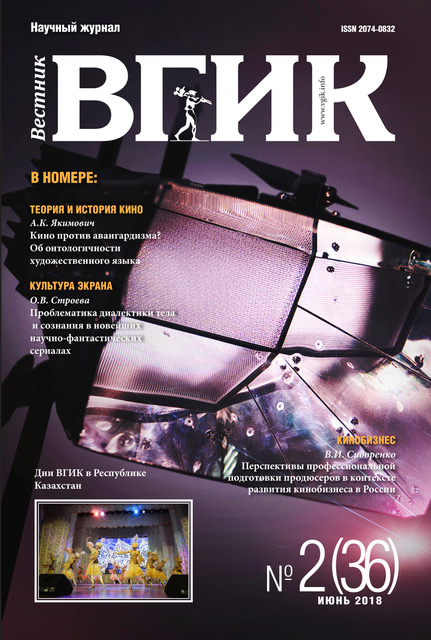“New Drama” in the Context of the Historical Film
- 作者: Kuzmina L.V1
-
隶属关系:
- Institute of Film Art, VGIK.
- 期: 卷 10, 编号 2 (2018)
- 页面: 142-151
- 栏目: TELEVISION | DIGITAL ENVIRONMENT
- URL: https://journals.eco-vector.com/2074-0832/article/view/14592
- DOI: https://doi.org/10.17816/VGIK102142-151
- ID: 14592
如何引用文章
全文:
详细
The article is devoted to the cultural phenomenon of the "new drama", which since its the beginning of the 2000s up to present day has a significant impact on the Russian cinema. The authors of the trend, first of all, are close to the theme of contemporaneity. However, while seeking for a holistic, philosophical understanding of time, they turn to the past. One of the most important historical films that appeared in the circle of the "new drama" were the TV-series The Diary of the Murderer (2002) by Kirill Serebrennikov, staged according to the scenario of the famous playwrights of the “post -Vampilov wave” Nina Sadur, Elena Gremina, Mikhail Ugarov. The creators of the picture offered their understanding of the revolution: they believe that this historical event was a diabolical game in which the notions of humanity and morality were destroyed. Kirill Serebrennikov masterfully presented their idea, using the techniques of postmodernist deconstruction: playing with the usual cultural cliches, particularly cinema (the heroic image of the commissar and the like), the director opens up a different sense of images and events behind them. Another important problem that the authors of the series are exploring is the fate of the intelligentsia and its ability to withstand the catastrophe of the revolution. They come to the sad conclusion that the educated people were too weak and too far from understanding what was happening to resist the morale of the lumpen manifested in the revolution. This understanding of history to some extent determined the approach of the "new drama" to the theme of contemporaneity. Particularly, the ideologists of the trend and the creators of the Theater.doc Elena Gremina and Mikhail Ugarov believe that a modern social theater and cinema will help the cultural layer to soberly look at reality, understand the psychology of the crowd and all the dangers associated with it.
全文:
Abstract: The article is devoted to the cultural phenomenon of the "new drama", which since its the beginning of the 2000s up to the present day has a significant impact on the Russian cinema. The authors of the trend, first of all, are close to the theme of contemporaneity. However, while seeking a holistic, philosophical understanding of time, they turn to the past.
One of the most important historical films that appeared in the circle of the "new drama" were the TV-series The Diary of the Murderer (2002) by Kirill Serebrennikov, staged according to the scenario of the famous playwrights of the “post -Vampilov wave” Nina Sadur, Elena Gremina, Mikhail Ugarov. The creators of the picture offered their understanding of the revolution: they believe that this historical event was a diabolical game in which the notions of humanity and morality were destroyed. Kirill Serebrennikov masterfully presented their idea, using the techniques of postmodernist deconstruction: playing with the usual cultural cliches, particularly cinema (the heroic image of the commissar and the like), the director opens up a different sense of images and events behind them. Another important problem that the authors of the series are exploring is the fate of the intelligentsia and its ability to withstand the catastrophe of the revolution. They come to the sad conclusion that the educated people were too weak and too far from understanding what was happening to resist the morale of the lumpen manifested in the revolution.
This understanding of history to some extent determined the approach of the "new drama" to the theme of contemporaneity. Particularly, the ideologists of the trend and the creators of the Theater.doc Elena Gremina and Mikhail Ugarov believe that a modern social theater and cinema will help the cultural layer to soberly look at reality, understand the psychology of the crowd and all the dangers associated with it.
作者简介
Lydia Kuzmina
Institute of Film Art, VGIK.
编辑信件的主要联系方式.
Email: editor@vestnik-vgik.com
Senior Researcher, Department of Modern Screen Arts, Institute of Film Art, VGIK
俄罗斯联邦, Moscow参考
- Беседы о театре // Октябрь, 2006, № 5 // URL.: http://magazines.russ.ru/october/2006/5/ dr11.html (дата обращения: 13.10.2017).
- Кирилл Серебренников: «Зритель хочет смотреть кино про свою страну». Интервью с режиссером Полины Васильевой // Искусство кино, 2003, № 3. - С. 13-16.
- Матвинко К. Час, когда мы не знали друг о друге, прошел // Театр, 2016, № 24/25 // URL.: http://oteatre.info/chas-kogda-my-ne-znali-drug-o-druge-proshel-sotsialnyj-teatr-v-doc-traditsii/ (дата обращения: 20.11.2017).
- Сеансу отвечают: «Время жатвы» // Сеанс, 2005, № 21/22 // URL.:http://seance.ru/n/ 21-22/films2004/zhatva/mnenia-4/ (дата обращения: 19.11.2017).
- Такой «некультовый» Серебренников. Интервью с режиссером Елены Афанасьевой // Новая газета, № 51 от 18.07.2002 // URL.: http://2002.novayagazeta.ru/nomer/2002/51n/ n51n-s28.shtml (дата обращения: 17.07.2017).
- Цыркун Н. Из опыта жизни и современные сказки. Дебюты-2014 // Хроники кинопроцесса, выпуск № 8: сборник статей. - М.: ВГИК, 2015. - С. 90-93.
补充文件







